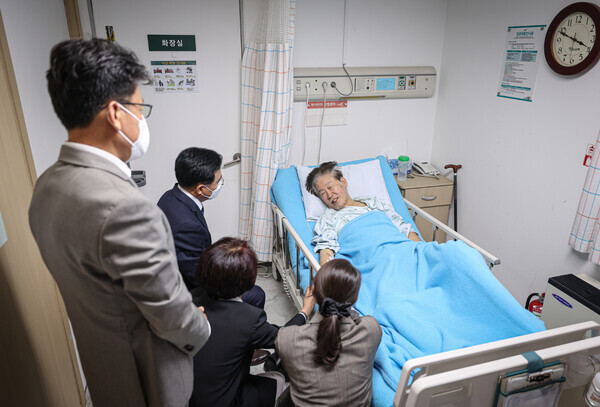hankyoreh
Links to other country sites 다른 나라 사이트 링크
[Editorial] After 24 days on hunger strike, Lee Jae-myung’s leadership faces greatest test

On Saturday, Democratic Party leader Lee Jae-myung ended his hunger strike after 24 days. While his gesture may have underscored the clarity of his struggle against the ruling People Power Party with his calls for full-scale reforms to the Yoon Suk-yeol administration’s governing approach, he did not fully succeed in dispelling suspicions that he was undertaking the hunger strike in an attempt to shield himself.
Lee reportedly ended his hunger strike based on strong recommendations from physicians who were concerned about his health deteriorating. This was the first long-term hunger strike by an opposition party leader since a 23-day one by future president Kim Young-sam in 1983, the former leader of the then-banned New Democratic Party.
In a press conference held on Aug. 31 for the one-year anniversary of his election to the party leadership, Lee said he would “begin a popular struggle against an incompetent and violent administration.”
He launched an indefinite hunger strike, with demands that included an apology from the administration for “destroying livelihoods and damaging democracy,” a statement of opposition to the ocean release of radioactively contaminated water from the Fukushima nuclear power plant in Japan and a complaint about it to the International Tribunal for the Law of the Sea, and a Cabinet reshuffle and full-scale revision of the administration’s governing approach.
At the time, some questioned whether he was doing so to turn things around with his potential legal worries — but he did succeed in drumming up popular support for the need to stop the Yoon administration from running amok.
It’s also true that the moral justification behind his hunger strike was tarnished somewhat when he came out with a position statement the day before the vote on his arrest motion, where he urged lawmakers to vote it down. Going back on his pledge to forfeit his immunity to arrest as a lawmaker, he all but invited cynics to view his hunger strike as a self-protection move after all. With his failure to win support within his own party, critics said he summoned a backlash that resulted in the motion being approved.
Not only did Lee fail to see through his demands from the administration, but he also failed to unite the Democratic Party.
Since the arrest motion vote, the Democratic Party has been plunged into what amounts to a state of psychological civil war. The party leadership has signaled its intent to discipline the Democratic Party lawmakers who voted in favor of the motion, while die-hand supporters have declared plans to “hunt down” and punish the members who voted to approve the motion.
Lee Jae-myung is the one who should be working to restrain them and restore some semblance of unity. So it’s unfortunate that he instead seems to be focused on shoring up his support base.
In a position statement issued after the arrest motion vote, he declared his plans to make “unbending efforts,” signaling his intent to hold on to his position as party leader. He also called on the Democratic Party to “take ownership over its shortcomings by compensating, assigning responsibility, and correcting.”
His message amounted to an appeal to die-hard supporters to rally and join the party. He did not include any expression of regret for going back on his pledge to waive immunity from arrest.
Now Lee’s political fate hinges on the outcome of a warrant review scheduled for Tuesday. If a warrant is indeed issued, it could plunge the Democratic Party into even greater turmoil.
Now that he has ended his hunger strike, Lee bears responsibility for resolving the extreme chaos that has descended on his party. He must ensure that the party is able to perform the way the top opposition party is supposed to: by reining in the administration’s excesses and tending to the public’s livelihoods.
With the hunger strike behind him, Lee faces an even bigger test of his leadership.
Please direct questions or comments to [english@hani.co.kr]

Editorial・opinion
![[Editorial] Intensifying US-China rivalry means Seoul must address uncertainty with Beijing sooner than later [Editorial] Intensifying US-China rivalry means Seoul must address uncertainty with Beijing sooner than later](https://flexible.img.hani.co.kr/flexible/normal/500/300/imgdb/original/2024/0517/8117159322045222.jpg) [Editorial] Intensifying US-China rivalry means Seoul must address uncertainty with Beijing sooner than later
[Editorial] Intensifying US-China rivalry means Seoul must address uncertainty with Beijing sooner than later![[Column] When ‘fairness’ means hate and violence [Column] When ‘fairness’ means hate and violence](https://flexible.img.hani.co.kr/flexible/normal/500/300/imgdb/original/2024/0516/7417158465908824.jpg) [Column] When ‘fairness’ means hate and violence
[Column] When ‘fairness’ means hate and violence- [Editorial] Yoon must stop abusing authority to shield himself from investigation
- [Column] US troop withdrawal from Korea could be the Acheson Line all over
- [Column] How to win back readers who’ve turned to YouTube for news
- [Column] Welcome to the president’s pity party
- [Editorial] Korea must respond firmly to Japan’s attempt to usurp Line
- [Editorial] Transfers of prosecutors investigating Korea’s first lady send chilling message
- [Column] Will Seoul’s ties with Moscow really recover on their own?
- [Column] Samsung’s ‘lost decade’ and Lee Jae-yong’s mismatched chopsticks
Most viewed articles
- 1For new generation of Chinese artists, discontent is disobedience
- 2[Editorial] Transfers of prosecutors investigating Korea’s first lady send chilling message
- 3[Exclusive] Unearthed memo suggests Gwangju Uprising missing may have been cremated
- 4[Editorial] Intensifying US-China rivalry means Seoul must address uncertainty with Beijing sooner t
- 5S. Korea “monitoring developments” after report of secret Chinese police station in Seoul
- 6N. Korean media upgrades epithet for leader’s daughter from “beloved” to “respected”
- 7Yoon says concern about biased diplomacy is being incited by “communist totalitarian forces”
- 8[Column] US troop withdrawal from Korea could be the Acheson Line all over
- 9Xi, Putin ‘oppose acts of military intimidation’ against N. Korea by US in joint statement
- 1060% of young Koreans see no need to have kids after marriage